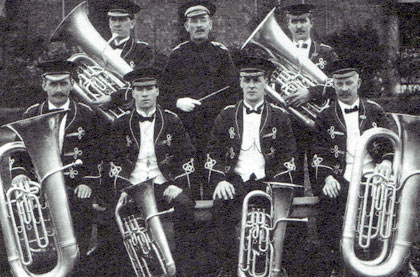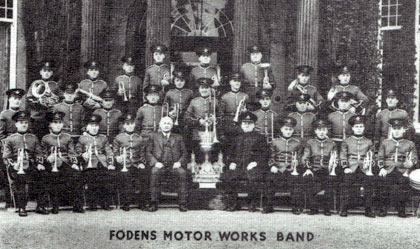Joe Moores - The finest bass trombonist who ever lived?
14-Aug-2006Allan Littlemore remembers perhaps the finest bass trombone player who ever lived - the great Joe Moores of the Fodens Motor Works Band.
Joe Moores was the finest trombone player who ever lived. That is a very bold assertion, especially from someone who never even played a penny whistle.
So what gives me the confidence to state this belief? Simple: He told me so nearly every day for well over six months!

Early success: Joe Moores on tuba (1st left back row) in 1920 with Fodens Quartet
It was 1957 and I was serving a student engineering apprenticeship at Fodens Limited. I was working in the Erecting shop and spent part of the time on the Axle section.
Abiding memory
Joe's job was to fit the brake linings to the aluminum brake shoes, firmly riveting them into place with about a dozen copper rivets. Then he filed down the edges with a rasp so as to aid the bedding in process. I mention this because the linings were composed mainly of asbestos, but didn't seem to do Joe's lungs any harm.
One abiding memory I have of him is that about a quarter of an hour before the end of the shift, Joe would disappear. Eventually I discovered the reason. He went on walkabout to find small pieces of wood with which to light his fire at home. So as to be inconspicuous, he tucked these between his trousers and his overalls, not forgetting to put his bicycle clips on first to stop the wood from dropping out!
In his early days Joe played E flat bass with Gossages Soap Works Band from Widnes. Towards the end 1915, Bandmaster Tom Hynes and professional conductor William Halliwell were, as ever, seeking to further improve Fodens Band.
Charade of a system
Seeking to improve the Bass Section in particular, they chatted over a number of names, but kept coming back to the name of Joe Moores. There was no real need for a audition, but neither of these fine musicians had the power of appointment - that rested with Billy and Edwin Foden the joint Managing Directors, and keen Band supporters. It was a bit of a charade but that was the system. In practice they just nodded their heads; well they always had done.
Joe and his wife were living at home of Joe's in laws, and further more he was without regular employment. Messrs Hynes and Halliwell felt they were onto a winner, and the Directors were, as usual, bound to go along with their recommendation.
The appointed day for the audition arrived and Joe presented himself in good time at the company's Head Office, bringing with him just his mouthpiece, as he had been instructed; Fodens would have a Bass for him to play on the play.
Not near his best
He was eventually shown into the Boardroom where he was confronted with the awesome sight of the Directors and, even worse, not an E Flat Bass, as he expected, but a B Flat Bass. Too overwhelmed to point out that he normally played the higher pitched instrument, Joe did his best to impress his august audience. Joe admitted to me that he was disappointed on two counts. One was that he had not played anywhere near his best.
The other was he felt let down that he had not been given his normal instrument. He was courteously thanked and shown the door.
That night, on arrival at Band Practice, William Halliwell and Tom Hynes could hardly believe their ears when they were told that the audition had been unsuccessful. It was only after pursuing with the Director's details of the audition that the truth dawned and an explanation became apparent.
Forthwith a letter was dispatched to Joe explaining the mix up, as Directors do, put the blame squarely on the shoulders of poor Tom Hynes. He was asked to come for another audition.
New audition
Joe Moores was one of the proudest and most stubborn men on earth and so it was typical of him when he told his wife of this intended plan. He would go to the second audition, naturally play quite brilliantly, be invited to join the Band, and turn the management down flat! His pride meant more to him than a place in Fordens Band, and a job.
Before the second audition got under way, Tom Hynes was once again made the scapegoat for the previous mix up, but from there on everything went smoothly with Joe playing just as Hynes and Halliwell knew he could. It seemed that Joe's plan was working out fine.
At this point Billy Foden sent for 'Bogie' Wright and explained, "This is Mr Moores. He is living in Widnes. He is joining the Band and needs a house. What have you got?"
"Right now I don't have one available," was his unwanted reply.
"What about the one in London road?" persisted Billy, pointed out that a widowed employee who had lived there, had recently died. "I've promised that to a man in the Foundry", countered the embarrassed Mr Wright. "Then tell him he can't have it. Arrange for Mr Moores and his wife to have it. Make sure it has some fires lit in it as it has stood empty for a couple of weeks and put two bags of coal in the coalhouse."

The Double hat trick winners: Joe Moores is in the middle row right behind the National trophy
"Now Tom," said Billy, as he addressed the chargehand fitter, "Mr Moores is going to learn from you how to be fitter. I've promised him the top rate of pay, so you see he justifies it."
See you next Monday
At last Billy turned to an amazed Joe. " Right that's it then. Band house and a job: Welcome to Fodens. Here's your train fare and something extra to pay to have your things brought over from Widnes. See you next Monday."
That was Band sponsorship 1915 style. Joe returned home in a state of bewilderment having barely uttered a word, let alone actioned his plan.
"Did you turn them down then?" enquired his wife on his return.
Joe was proud and Joe was stubborn, but he knew when he was onto a good thing.
"I'm going to give it a try, " were the only words that Joe could grudgingly muster.
Nearly 40 years
Give it a try he did. Joe went on to play Fodens Motor Works Band for a total of forty-nine years. The ultimate irony of the story however, was that around ten years later, just prior to the 1926 Belle Vue contest, he realised an ambition when he was able to take up playing the bass trombone. That was to last for nearly forty years.
Towards the end of his career, Joe went with Men o' Brass to Canada. On arrival the local press photographer, looking for a slant to his work, asked that he photograph the oldest and youngest member. Joe was the oldest and James Charles, still associated with Fodens Band, was the youngest. But that posed a problem. Joe was six feet tall with a long slender trombone. Jim was much smaller and with a cornet. Try as he might, the photographer could not compose them in the same frame. At this point a most frustrated photographer addressed the person that Joe thought was the world's greatest trombone player and said, " Would you mind very much if I photographed you holding a cornet?"
Joe retired from playing in 1965. This eminence grise of bass trombone players has served Fodens Band for all but fifty years. In his career he had won the National Championship, played for the King and Queen, toured Europe, played in South Africa, North America and won over eighty medals at solo competitions.
Joe Moores died in 1976 at the great age of eighty-eight.
Copyright Allan Littlemore
Sandbach.















